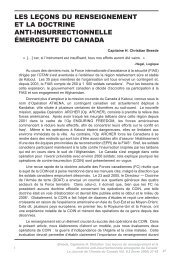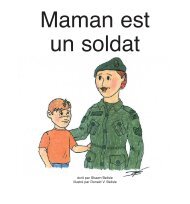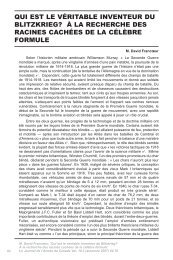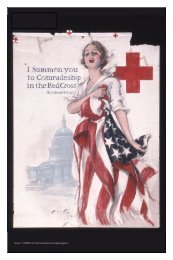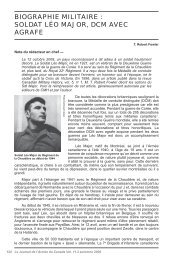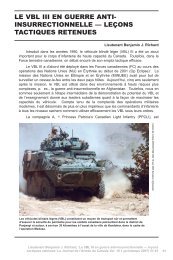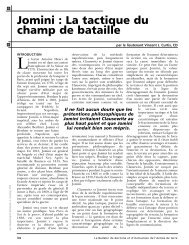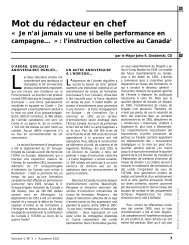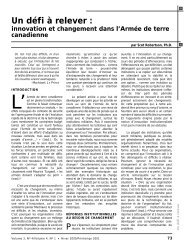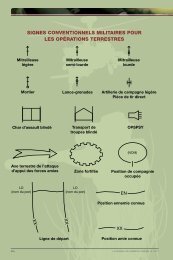The Canadian Army Journal
The Canadian Army Journal
The Canadian Army Journal
Create successful ePaper yourself
Turn your PDF publications into a flip-book with our unique Google optimized e-Paper software.
104<br />
While Nixon and the others fought for their lives in the schoolhouse, Mitchell at<br />
battalion headquarters tried to establish a clear picture of the situation up ahead. <strong>The</strong><br />
conflicting nature of the information available convinced him to hold back the 17-pounder<br />
anti-tank guns used to consolidate a secured position, fearing their capture or<br />
destruction if committed too early. Instead, he ordered Pinkham to reconnoitre gun<br />
positions at first light and call in the guns as needed. 49 To alleviate the pressure on his<br />
companies, he requested support from tanks or heavy armoured cars at 07:00 explaining<br />
to Megill that the situation, although seemingly solid at first, had now deteriorated.<br />
Instead of complying immediately with the request, which was indicative of the souring<br />
relationship between the Black Watch CO and the Brigade Commander, Megill radioed<br />
that “armoured cars were not suitable in daylight and would take too long to get there”<br />
and demanded further details before he would accommodate the request. 50 Immediately,<br />
Mitchell fired back that “one company was cut off” and that the situation continued to<br />
deteriorate. 51 Megill’s response was to send a Liaison Officer up to “find out the full<br />
story.” Exasperated, Mitchell sent one final message a full hour after his first request<br />
was made: “Can you send armoured cars even if it does take 2 hours?” Finally, at 08:17,<br />
Megill acquiesced, and not only did he order a troop of armoured cars to Spycker, but<br />
called in air support on the coastal rail guns in Dunkirk. By 09:26, the armoured support<br />
had yet to arrive and Mitchell once again contacted Megill to ask when they could be<br />
expected; “as soon as they come” was the only response.<br />
Meanwhile in Spycker, German infiltration increased in both frequency and boldness<br />
as the day wore on. In C Company’s position, one German non-commissioned officer<br />
(NCO) managed to make it within five yards of Pinkham’s headquarters before Bren fire<br />
brought him down. His demised tipped off the position of four others who remained in<br />
slit trenches after daybreak and they paid the ultimate price for their indiscretion. Later,<br />
Pinkham noticed a group of 27 Germans retreating northwest through a nearby farm<br />
building and turned his snipers loose; within seconds, six lay dead with the rest<br />
scattering among the wheat. 52<br />
<strong>The</strong> remnants of B Company, which Mitchell “persuaded” to return to Spycker,<br />
arrived in one piece during the night and took up<br />
positions in the Church—just a stones throw from<br />
the school on the other side of the graveyard. By<br />
daybreak, the scene inside what was left of the<br />
church, reminded one of Dante’s Inferno. <strong>The</strong> dead<br />
and wounded lay on the pews and in the aisles,<br />
while Marcel Paresys (the local Abbott) worked the<br />
floor distributing rosaries and administering the<br />
Last Rites. <strong>The</strong> wounded, at least those that could<br />
still fire, were propped up against windows with the<br />
aid of mattresses. In the corner, a signaller, killed<br />
when shrapnel pierced his skull, sat motionless<br />
over his radio, headset still in place looking as<br />
though he were asleep. Blood, discarded dressing<br />
packages and plaster dust lay everywhere; shell<br />
casings littered the floor, and the smell of sulphur,<br />
urine and cigarette smoke hung thick while one<br />
severely wounded man, delirious and fighting<br />
shock, cursed for anyone to give him a shot of rum<br />
that he could not afford to have.<br />
Finally at 10:00, the first signs of support<br />
arrived in the form of a lone 17-pounder which set<br />
fire to a barn used as a German base west of the<br />
Abbott Marcel Paresys<br />
<strong>Canadian</strong> <strong>Army</strong> <strong>Journal</strong> Vol. 11.1 Spring 2008


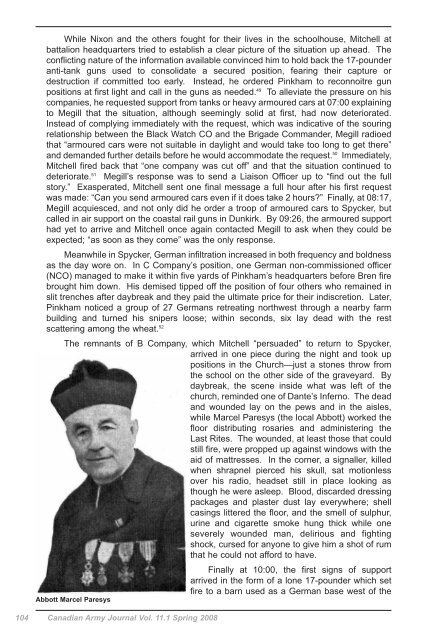
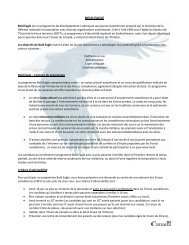
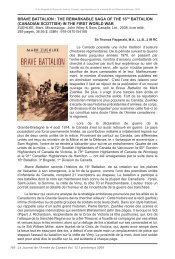
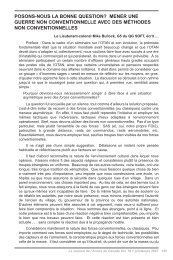
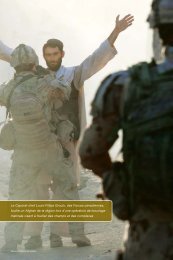
![La modularite dans l'Armee de terre canadienne [pdf 1.6 MB]](https://img.yumpu.com/17197737/1/188x260/la-modularite-dans-larmee-de-terre-canadienne-pdf-16-mb.jpg?quality=85)
